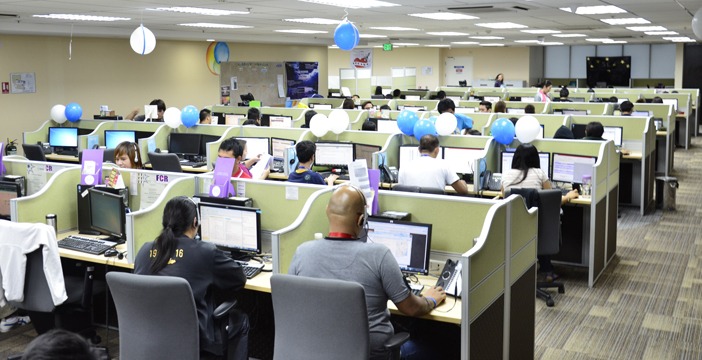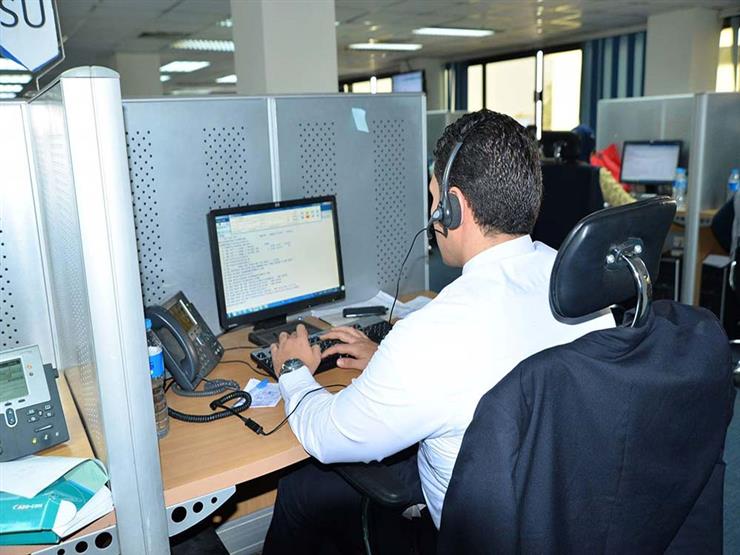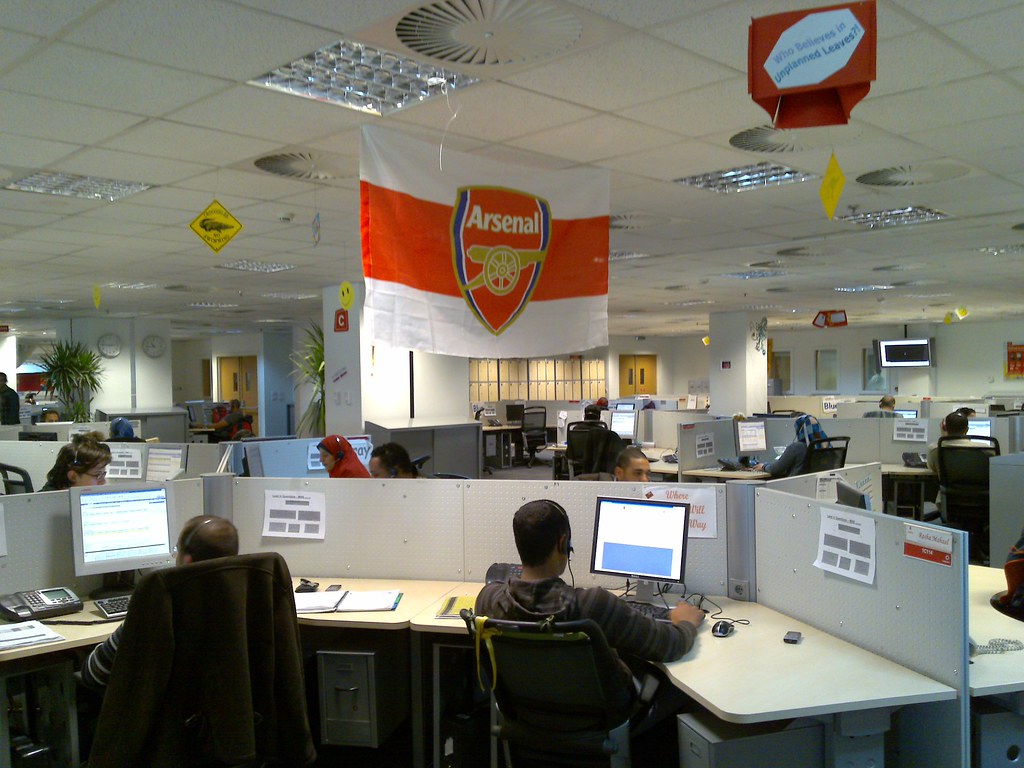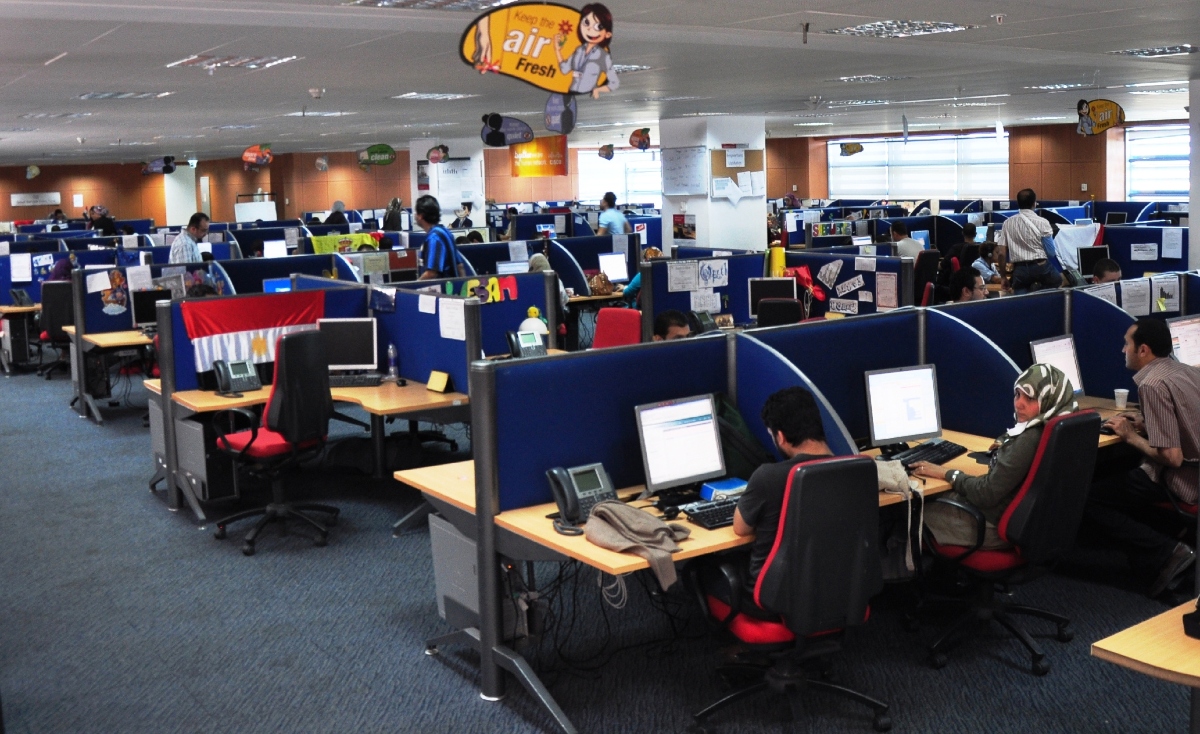“My mother once told me that I was sleep-talking, as if I was answering phone calls during my sleep. That’s how much it messes with your mind,” says 29-year-old Mohamed Sayed, on his work at a call center in Egypt.
At the end of last year, Cairo woke up to the extremely devastating news of a call centre employee who died by suicide, reportedly due to workplace stress. Multiple groups on social media began sharing the news while commenting on the harsh workplace conditions that call center agents go through, and the daily stress associated with their jobs, whether with clients or with their managers.
Despite being a highly stressful job, millions of Egyptians work at call centers, whether for a temporary period, or as a permanent source of income.

“When I first started working at a call center, my first call was with a sexual harasser,” says 30-year-old Marina R. who has been working at call centers for over seven years.
“I was not allowed to hang up, I could only put him on hold, and pass the call to the assisting team. But I remember thinking, ‘What if the person answering from the assist team is also a woman?’”
Regardless of how triggering it may be for her to answer further calls from the same harasser, Marina explains that she is forced to act normal and simply “deal with it”.
Stress, stress, and more stress. This is how Sayed describes his six years working at call centers. “If I’m one minute late to work, it’s deducted from my salary. If I’m one minute late from my break time, that’s also deducted from my salary,” he recalls.
According to Sayed, a job as a call center agent does teach one to be patient and, sometimes, remain calm. However, it may also engender feelings of helplessness and frustration.
“Call centers are definitely a learning experience, but if your mental health is not okay, a job at a call center can destroy you,” Sayed firmly adds.
At any job, having a clear head and leaving one’s personal life at home is key, and call centers are no different. Sayed highlights that having just one problem on his mind may make it impossible to concentrate and not lose his temper amid all the stress.
Additionally, Sayed touches upon the subject of the incident of the Egyptian employee who took his own life. “People who sympathized the most with the recent news of the man who died by suicide were all people who work or experienced working at a call center.”
On a different note, Marina attributes the high turnover at call centers to high pressure and low salaries. Sayed, who worked at multiple call centers from 2014 to 2020, echoes Marina’s theory.
“Call centers like to hire undergraduate students because they offer them very low salaries, and they know that students will accept that,” says Sayed.
Likewise, Marina remembers how she was paid EGP 800 (USD 50.93) a month when she first started working after graduating in 2011.
In Egypt, the average monthly salary for a call center representative working in Arabic is EGP 3,500 (USD 222.80). In the case of those working in English, the salary can reach EGP 6,500 (USD 413.77) and more. Some benefits at call center jobs include transportation and meal allowance, phone lines with free minutes and mobile data, in addition to medical insurance.
Sayed worked at call centers for two telecommunications companies and one ride-hailing service. He confirms that the promotions system is the same in all three.
“You only have a chance of being promoted if you’re part of ‘el shella’ (the gang), even if another team member is more deserving. And, it’s not just that, if I want to promote Mahmoud, Mohamed has to leave,” he says, referring to two hypothetical employees replacing each other. “For me to go up the ladder, the person above me has to leave. Even then, I will not get promoted if I’m not on good terms with my boss,” he explains. “Can you imagine not being promoted from your position for seven years?”

Additionally, Marina and Sayed both complain about the inconsistency of the workflow. From rotational shifts and weekends that regularly change, to targets and Key Performance Indicators (KPIs) that are also ever-changing, the job is often quite grueling.
“You don’t have time for your own life and your days are always upside down because of the rotational shifts that you’re continually trying to adapt to. One day you’re working in the morning and the other day, you’re working at night. You have no social life whatsoever,” says Mohamed Mostafa, a 25-year-old Egyptian banker who worked at a bank’s call center for a year.
Mostafa says that the time he spent at the call center was stressful and that he never planned on continuing that job, vowing to never return. He remembers how a client had given his bank card number to someone thinking it was the bank, and, as a result, money was stolen from him.
“The caller fought with me, and when I tried to handle the situation, explain that it’s a scam and that it wasn’t the bank that called him, he fought with me and was convinced that I have to return the money back to him,” he recounts.
While Sayed thinks that the vast majority of the pressure the agents receive is from inside the call center itself, and only a small fraction of it is from the phone calls, Marina thinks otherwise.
“Call centers normalize the idea of an agent being insulted,” she explains.
Marina describes how call center managements treat agents “as if they’re slaves because the client’s money is more important than your presence in the company”.

“Call centers suck the life out of you, and if you reach the age of 30, you’re stuck for the rest of your life,” says Marina. Sayed reiterates Marina’s viewpoint, comparing call centers to sand as they sweep you in, and emphasizing that nobody who leaves this field returns to it.
Despite being an industry known for high turnover rates, unfair staff policies, high levels of staff burnout, stressful work environments, and low salaries, many continue to work at call centers. This is mainly due to lack of better opportunities, not wanting to start over somewhere else, and having commitments and responsibilities that paralyse workers from leaving a job they are struggling with.
“It feels like you’re in a toxic relationship; you want to leave, but you don’t know what awaits you outside this place,” concludes Marina.







Comments (3)
[…] It Sucks the Life out of You: The Struggles of Working in a Call Center in Egypt […]
[…] “إنها تقضي على حياتك”: معاناة العمل في مركز اتصال … […]